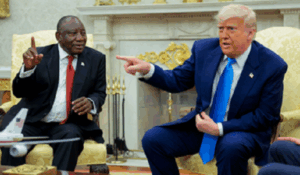U.S. new tax bill threatens substantial tax increases for Canadian companies
U.S. President Donald Trump‘s new tax bill is threatening to significantly hike rates for Canadian corporations and could cost investors holding U.S. securities up to $81-billion in additional taxes over seven years.
On Thursday, the U.S. House of Representatives passed the Republican legislation, titled the One, Big, Beautiful Bill, with a narrow vote of 215-214. If it becomes law, it will override the Canadian-U.S. tax treaty that has been in place since 1942.
The 1,100-page document includes section 899, a tax proposal created as a retaliatory measure against what the U.S calls “discriminatory or unfair taxes” of foreign countries, including Canada’s digital services tax (DST), which was introduced in 2024.
The U.S legislation is still required to be passed by the Senate and receive presidential approval before it can become law. The White House expects the President to sign the final bill by July 4.
Canadian corporations that receive dividends from U.S. subsidiaries are currently subject to a 5-per-cent withholding rate under the tax treaty between the U.S. and Canada, much lower than the statutory rate of 30 per cent.
But under section 899, Canadian companies would see their tax rate increase by five percentage points each year until it reaches 20 percentage points above the statutory rate, or 50 per cent. It would remain in place until the “unfair tax” is removed.
Similarly, Canadian individuals who own U.S. securities directly are subject to a 15-per-cent withholding tax rate under the current treaty, reduced from the statutory rate of 30 per cent. Under section 899, the withholding rate could ultimately rise to 50 per cent.
Ian Bragg, vice-president of research and statistics at the Securities and Investment Management Association, said that the current draft of the legislation could cost Canadian investors more than $81-billion in additional taxes over seven years.
“These measures would penalize ordinary Canadians saving for retirement, education, or other long-term goals, and create unnecessary uncertainty in the market,” Mr. Bragg said in an e-mailed statement.
“It’s critical that this issue be addressed at the highest levels of Canada-U.S. trade discussions to protect the savings and financial security of millions of Canadians.”
Max Reed, a cross-border tax lawyer and principal of Polaris Tax Counsel in Vancouver, said that if the bill is enacted, section 899 would “rupture” the Canada-U.S. tax relationship the same way that Mr. Trump‘s tariffs have impaired the Canada-U.S trade relationship.
“The results would be significant,” Mr. Reed said in an online post to clients. “Virtually all cross-border planning would be turned on its head.”
The tax bill also removes long-standing tax exemptions for governments and related entities. That means organizations such as the Canadian Pension Plan Investment Board and First Nation communities could be required to pay tax.
For Canada’s multinational companies with operations in the U.S., the proposed tax changes will place them at a competitive disadvantage to domestic U.S. companies and to subsidiaries of other foreign multinationals that don’t have similar discriminatory taxes, said Ron Nobrega, a tax partner at Fasken Martineau DuMoulin LLP in Toronto.
“I would assume that at some point, given the fiscal impact on Canadian companies and their competitiveness in the U.S. marketplace, that Canada will have to move away from the digital services tax, will have to repeal it,” Mr. Noberga said in an interview.
Kim Moody, founder of Moody Tax Law in Calgary, agrees that the Canadian government should drop the DST.
“Canada has to see the bigger picture that America is creating a big fortress, and do we want to lob grenades over the fortress wall?” Mr. Moody said in an interview. “The DST is a big aggravator of the U.S., and the fact that Canada is willing to not play ball on that is ridiculous.”
Earlier this year, Prime Minister Mark Carney said in his campaign documents that the Canadian government “will not surrender on rules that ensure large multinational companies pay a fair and consistent share of the profits they earn in a country.”
As Mr. Trump‘s legislation makes its way through Congress, debate and analysis of its potential repercussions will continue, said Karl Dennis, KPMG‘s national leader for the U.S. corporate tax team in Canada. But he does expect Canadian individuals and businesses to face higher rates of U.S. tax on their U.S. income.
“The actual extent of the impact will vary,” Mr. Dennis said in an e-mail. “It’s important for Canadians with U.S. investments to monitor developments relating to this provision as this bill moves through the legislative process.”
This article was first reported by The Globe and Mail















